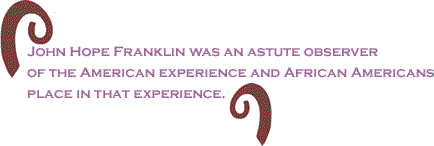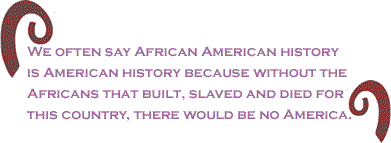
|
|||||||||||||||||||||||

|
|||

Custom Search
|
|||
 |
|||
The death of preeminent historian and race scholar, John Hope Franklin, and his life long contribution to helping America understand the legacies of slavery and racial vestiges that have been carried forward that still makes race the most entrenched socio-economic-political issue of our society. John Hope Franklin’s life’s work was to reassemble the fragmented history of the descendants of enslaved Africans and interweave the buried, hidden and oft stolen contributions of enslaved Africans and their American born descendants into American history. We often say African American history is American history because without the Africans that built, slaved and died for this country, there would be no America. Long before African American history was acknowledged as a discipline
worthy of study, and long before the history of African Americans
was deemed worthy of scholarly publication, Franklin’s From
Slavery to Freedom: A History of African Americans (2 Vols. in 1) Unlike Frederick Douglass and W.E.B DuBois before him who documented
the black experience in the context of their own experience (study/advocacy),
John Hope Franklin was an astute observer of the American experience
and African Americans place in that experience. Yes, he was a part
of that experience also, yet he managed to relegate himself to the
role of historian until he was 90 years old - when he finally allowed
himself to be placed at the center of history in his own autobiography,
Mirror
to America Franklin maintained that America could never escape its racial past until it addressed its racial past. Not that it hasn’t tried. Reconstruction, Desegregation, Integration, “Affirmative” Action, Colorblindness were all eras to try to redeem the racial past. Only to be followed by Redemption, Segregation, Anti-Busing, Angry White Male and Post-Affirmative Action eras to remind us that race is real in America. President Bill Clinton appointed a race commission to address the issue of racial reconciliation in America. He appointed John Hope Franklin to head his “Initiative On Race” Commission in 1997 and we thought we almost there, until Bill went to Africa and refused to apologize for slavery. The “conversation” on race went down hill from there but at least America tried to have a civil discussion about race, if not for just a moment, and John Hope Franklin led the discussion.
Last year, when it looked like Barack Obama was going to win the nomination of the Democratic Party for President of the United State-“a new racial benchmark,” the press and the pundits started talking about whether we had reached a “post” racial period in America, a period that signified the “insignificance of race.” A “Post-Racial” America was now looking at whether it was possible to look past race in electing an African American President. While most said it was “possible,” nobody was willing to bet the farm (or the house, those who still had one) on it. Even as January 20th approached and it was “all but said and done,” we all knew this was still America and racism could raise its ugly head at any moment, for there really never is a post racial period in America. America has two periods as it relates to race, racial and really racial. Slavery, Jim Crow Segregation and the Anti-Affirmation Periods were the “really” racial periods. Everything else was racial realities in everyday America. John Hope Franklin knew this and said this on many an occasion. There is nothing “post” about race and racism, maybe except “Post-Slave Traumatic Stress Syndrome.” The election of Barack Obama hasn’t changed that at all.
We still need somebody to put this in a true historical perspective. An ode to the life of John Hope Franklin. He was a man who helped document our history within the racial complexities and race conflicts of a country that never acknowledged race, but forever tried to formulate race caste systems, and refused to write about it until a true historian sought to tell both sides of American history. Franklin proved that within our story is America’s story and America “Negro problem” was a refusal to acknowledge the equality of black America. It’s still America’s problem today, even with Barack in the White House. But he too is now American history-not just “black history.” It was John Hope Franklin that first said the two are inseparable. We now know that to be the case and making black history and American inseparable will forever be John Hope Franklin’s legacy. And there’s nothing post racial about it. BlackCommentator.com Columnist, Dr. Anthony Asadullah Samad, is a national columnist, managing director of the Urban Issues Forum and author of Saving The Race: Empowerment Through Wisdom. His Website is AnthonySamad.com. Click here to contact Dr. Samad. |
|||
Any BlackCommentator.com article may be re-printed so long as it is re-printed in its entirety and full credit given to the author and www.BlackCommentator.com. If the re-print is on the Internet we additionally request a link back to the original piece on our Website. Your comments are always welcome. eMail re-print notice
If you send us an eMail message we may publish all or part of it, unless you tell us it is not for publication. You may also request that we withhold your name. Thank you very much for your readership. |
|||
| |
|||
| April
2 , 2009 Issue 318 |
|
| Executive Editor: Bill Fletcher, Jr. |
| Managing Editor: Nancy Littlefield |
| Publisher: Peter Gamble |
| Est. April 5, 2002 |
Printer Friendly Version
in resizeable plain
text format or pdf
format. |
| Frequently Asked Questions |
 |

|
 |
 |
 |
| |
| |




































